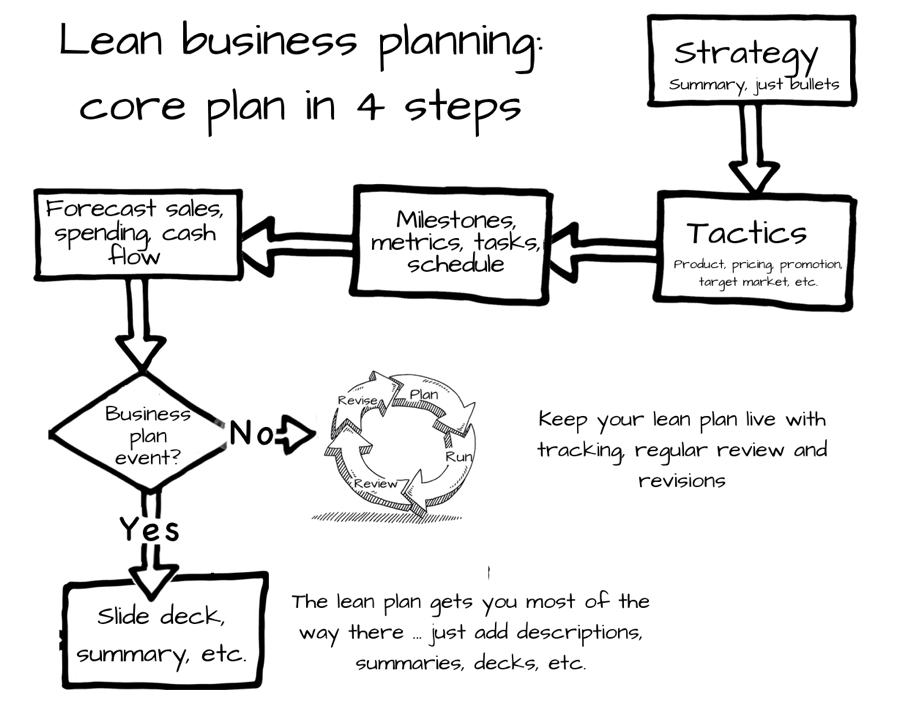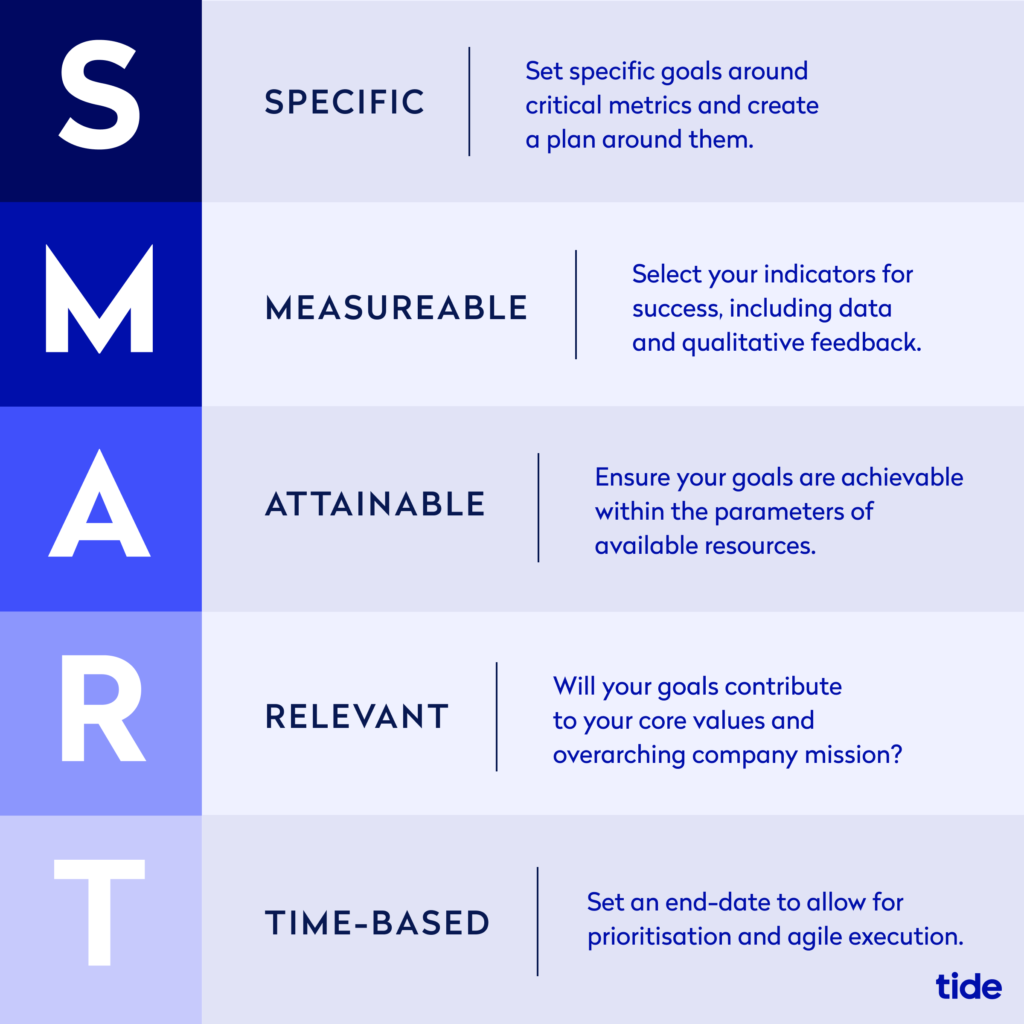A business plan is a written document that clearly outlines the business and its future. It is basically the bible for your business, and will provide the needed guidance for all future decisions made regarding the company. Having a business plan help you reduce risks, organize your ideas and focus on the key points of your plans. Without a plan to refer to, most entrepreneurs might feel lost and unsure of their next steps as they try to find their way while operating their businesses.
In this article, we will provide you with an example of what a business plan should look like and introduce you to the main contents of a business plan. Furthermore, we’ll explain how to write a business plan step by step, types of business plan, startup business plan template what elements make a good plan and help you choose which approach to take when creating your own plan.

How to create a business plan for a new business
A business plan is a document that describes the goals, strategies and reasons for starting or running a business. It helps you to think about your business in an organized way, and to make important decisions about how you’re going to grow your company.
A good plan will help you keep track of your business’s progress, so you can evaluate how well it’s doing and where it might need improvement. It will also show investors or lenders how feasible your idea is and how much money they should be willing to invest in it.
This guide will walk you through all the steps involved in writing an effective business plan for your new startup.
First, you need to decide whether to write a full-blown business plan or create a shorter, simpler version of a business plan. If you are planning to raise money from investors or use a bank loan, then you will need a full-blown business plan. A full-blown plan explains how the company will operate and make money.
You may also want to write a summary version if you are just looking for feedback on your idea. This type of plan is often called an Executive Summary. However, if you have no intention of raising money or getting bank financing, then it’s not necessary to go through all the steps involved in writing a full-blown business plan.
The business plan is a vital tool for any entrepreneur. It can help you raise money, attract partners and customers and guide your company through tough times.

The essential elements of a business plan are the same for all types of businesses, but some plans require more detail than others. Here’s what you need to know about the different types of business plans and how to tailor yours to fit your needs.
Types of Business Plans
Startup Plan: A startup plan is used when you’re starting a new business from scratch or taking over an existing one. This type of plan usually focuses on the big picture — where you want to be in five years and how you’ll get there — as well as short-term goals that might take a year or less to achieve. In addition to financial projections, startup plans often include marketing strategies, marketing budgets and sales targets. They also often include statements about key personnel and their qualifications, as well as an outline of what makes this particular business unique.
Growth Plan: Once your new venture has been up and running for a while, it’s time to think about growth — expanding into new markets, introducing new products or services, hiring more employees or making other changes that will help expand your customer base beyond its current limits
Second, consider what type of business plan is best for your situation:
Venture Capitalists and Angel Investors – These investors expect more information about the company and its management team than do banks and other financial institutions. They are looking for companies that can grow quickly and make them lots of money quickly!

Banks – Banks want specific financial projections that show how much money will be coming into the company over time (and when). They also want detailed information on how much debt each person has taken on personally (as well as any personal guarantees they’ve given). Banks also need information about how much
A business plan is a written document that describes the nature of your business and the objectives you want to achieve. It’s often referred to as a blueprint for your company, because it covers everything from how much money you need to raise to how you’ll run your business day-to-day.
A good business plan helps you decide what kind of company you want to run, how you’ll get there, and what resources are required. It also gives investors confidence in your ability to grow their investment.
A well-written business plan distills all of these elements into a clear vision for your company and its future success.
Business plans should be tailored to each individual business, and they can be used at any stage in the life cycle of a company: when starting up a new firm; when planning significant changes or growth; when seeking funding; or even when contemplating closure.
A business plan is a document that describes your business, how it will operate and what you need to get it started. It also includes a description of your marketing strategy and financial projections.
Business plans are important because they help you decide whether or not to start a business, and if so, which kind. They can also help you decide how much capital you’ll need, help you raise money from investors and lenders, and provide a blueprint for success once your company gets off the ground.
The first step in writing a business plan is to decide what kind of business you want to start. Is there an opportunity for profit in this market? Who are your competitors? What products or services will your company sell? How will you make them? Will customers pay for them? Are there any obstacles that might prevent customers from buying from you? If so, what can be done about them?
Once you have decided on an idea for a business, write down all the details about it that come to mind — no matter how trivial. It’s important not to leave anything out when writing a business plan because these details can make all the difference between failure and success once your business gets up and running.

Startup business plan template
As a business owner, you’ll need to write and edit a business plan for your company. A good plan will help you get funding, keep track of your financial situation, and set goals for your business.
Start by writing out the reasons why you want to start this business in the first place. If you’re not sure where to start, use our free business plan template or check out our guide on how to write a business plan.
Once you’ve got a draft of your business plan, take it to some potential investors or other companies that can help you with funding or advice. Ask them how they would improve it if they were going through the same process.
Next up is finding an investor who wants what you’re selling. There are many different kinds of investors out there — angel investors, VCs (venture capital firms), private equity firms — each with their own areas of expertise and interests in different types of deals.
When choosing which route is right for you and your company’s needs, consider whether or not there’s enough money available for investment at this time and whether or not the investor has experience with similar companies in the past that could help inform their decisions about yours (or even provide opportunity for future work together).
A business plan is a written description of the business you want to start, your goals and objectives, and how you intend to achieve them.
The purpose of a business plan is to give you a clear understanding of your venture before you start it. It will help you take the right decisions at the right time.
Business plans are useful in raising finance for your business. They enable you to present your ideas clearly and convincingly to potential investors and lenders.
It is important that you should take the time to write a good business plan before starting your new venture as this will help you define what direction you want your business to go in, how much money is needed, how it will be marketed and where it will be sold etc.
